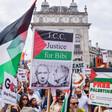Rights and Accountability 22 April 2022

Palestinian woman pray in front of the Dome of the Rock at Jerusalem’s al-Aqsa mosque compound on 22 April.
APA imagesRocket fire from Gaza was reported late Friday after Israeli police used violent force against Palestinian worshippers following prayers at Jerusalem’s al-Aqsa mosque earlier in the day.
Israeli violence against Palestinians on the third Friday of Ramadan again threatened to spill over into Gaza.
There was a flurry of diplomacy following Israel’s attack on the holy site last week to try to prevent a full-scale confrontation in Gaza like the one that devastated the territory in May last year.
Those 11 days of heavy rocket fire from Gaza and Israeli bombardment of the territory was precipitated in large part by violence against Ramadan worshippers at al-Aqsa.
The situation remained precarious during the week as Israeli Jewish nationalists marched through Jerusalem on Wednesday chanting anti-Palestinian slogans such as “death to the Arabs.”
Later that evening, a rocket was fired from Gaza, landing in an open area near Sderot in southern Israel. Israel carried out air raids on Gaza early Thursday, which were followed by additional rocket and gunfire from the besieged territory.
No serious injuries were reported from Gaza or Israel.
Both Hamas, which oversees Gaza’s internal affairs, and Naftali Bennett, Israel’s prime minister, appear to be trying to avoid another major escalation.
However, Hamas officials reportedly told international mediators that continued violations at al-Aqsa could set off another military confrontation with Israel.
The resistance group has repeatedly called for mass Palestinian mobilization in defense of al-Aqsa and Jerusalem in recent days.
Palestinians confronted Israeli riot police stationed around the mosque complex in Jerusalem on Friday by throwing stones and setting off fireworks following dawn prayers.
Israeli police fired tear gas canisters, rubber-coated bullets and stun grenades towards Palestinians inside the complex but did not raid or fire into al-Aqsa mosque as they did last Friday.
More than 150 worshippers were injured last Friday, and more than 400 were arrested in the attack on the mosque that was documented in dozens of videos that circulated online.The Palestine Red Crescent Society said that more than 30 Palestinians were injured, 14 of them hospitalized, this Friday, which marked the beginning of the last 10 days of Ramadan.
The al-Aqsa compound, where Israeli extremists have unsuccessfully sought to hold an animal sacrifice during the Jewish holiday of Passover, which ends on Saturday, is closed to non-Muslims during the final 10 days of the fasting month.
More than 150,000 Palestinians were reported to have attended afternoon prayers at al-Aqsa on Friday.
Videos published on social media show drones firing tear gas on crowds of worshippers at al-Aqsa mosque on Friday:
Israeli forces also fired rubber-coated bullets at journalists within the compound: A munition fired by Israeli forces set a tree on fire within the complex: A Palestinian flag was hung on the Dome of the Rock at the al-Aqsa mosque complex on Friday, reportedly for the first time in 20 years:“Apartheid”
On Friday, a UN human rights expert blamed “international inaction” for escalated Israeli violence against Palestinians in recent weeks.
Michael Lynk, the UN special rapporteur on human rights in the West Bank and Gaza Strip, said that Israel’s decades-long occupation “has become indistinguishable from practices of apartheid” and “is based on the institutional discrimination of one racial-national-ethnic group over another.”
He added that “history teaches us the bitter lesson that prolonged and unwanted alien rule is invariably enforced by violence and resisted by violence.”
The office of the UN secretary-general, Antonio Guterres, meanwhile repeated well-worn words of “deep concern” on Wednesday.
Guterres’ spokesperson said that the official is “actively engaged with leaders to do all they can to lower tensions, inflammatory actions and rhetoric, and restore calm.”
Guterres’ Middle East envoy, Tor Wennesland, similarly emphasized de-escalation on Tuesday while drawing a false parity between Israeli occupation authorities, on the one hand, and Palestinians resisting colonial oppression, on the other.
He obliquely referred to the “spreading of misinformation and incitement” while imploring “leaders on all sides” to “reduce tensions, create the conditions for calm and ensure the status quo at [al-Aqsa] is protected.”
The Times of Israel noted that Wennesland’s references to misinformation and incitement are “nearly identical to the talking points used by Israeli officials” who say that Hamas and other parties are “stoking tensions” by claiming that Israel aims to change the status quo at al-Aqsa.
Palestinian observers point to a gaslighting campaign aimed at minimizing the real threat posed against the holy site by Jewish extremists who seek to destroy al-Aqsa and who enjoy the support of Israeli lawmakers.
An analysis by Nir Hasson, published by Haaretz, Israel’s leading newspaper, rejects the idea that Israel has “secret plans” to force Muslims out of al-Aqsa “and turn it into a site of Jewish worship.”
The argument goes that the so-called Temple Mount movement, which seeks the destruction of al-Aqsa and the building of a Jewish temple in its place, is a fringe group who are “unpopular with most Israelis.”
But as Zvi Bar’el, another Haaretz analyst observes, the seizure of Palestinian property around the mosque complex and Israeli construction around the holy site makes for a “realistic diagnosis” that a war over the holy site “is only a question of time.”
There is historical precedent for the upending of the status quo of a major Palestinian holy site.
After an American-born Jewish settler massacred 29 worshippers in Hebron’s Ibrahimi mosque in 1994, Israeli forces partitioned the holy site and shuttered the formerly bustling adjacent Old City.
Palestinians fear that without determined resistance, Israel will seize any opportunity to impose similar measures at al-Aqsa.
Teen dies after exchange of fire
Meanwhile on Friday, 18-year-old Lutfi Labadi died from his injuries four days after being wounded in the head by Israeli forces in Yamoun village near the northern West Bank city of Jenin.
A photo of Labadi circulated on social media after the announcement of his death:





